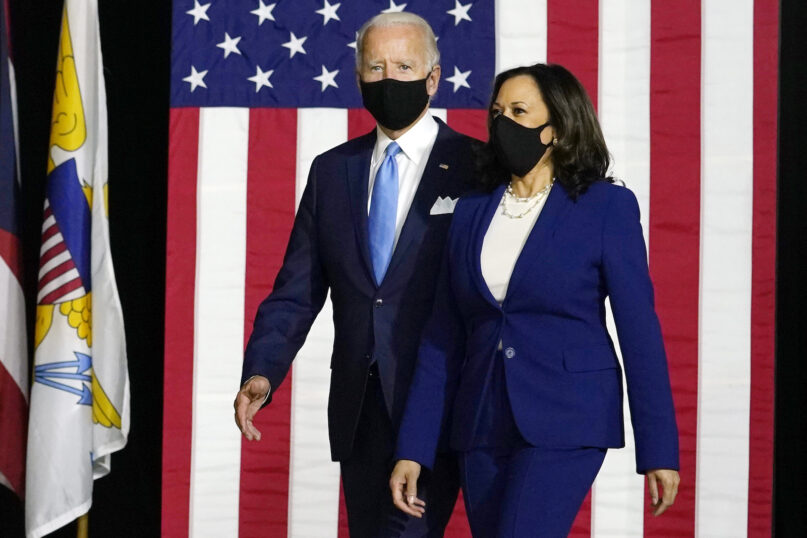WASHINGTON (RNS) — A Democratic group dedicated to representing secular values unveiled a slate of recommendations for President-elect Joe Biden’s incoming administration on Monday (Nov. 30), outlining a sweeping agenda designed to roll back many of President Trump’s actions involving religion and to “restore a vision of constitutional secularism.”
The 28-page document, crafted by the Secular Democrats of America PAC, is being presented to the incoming administration by Democratic Representatives Jamie Raskin and Jared Huffman — both co-chairs of the Congressional Freethought Caucus.
The SDA’s agenda offers a wide range of policy recommendations to push back against the so-called “Christian nationalist movement,” which the the group describes as an “extraordinarily well-funded and well-organized” phenomenon whose “extreme and sectarian agenda (was) on constant display under the Trump-Pence administration.”
The group offered several recommendations to help “reframe” concepts of patriotism in ways that are more inclusive. Among them were encouraging politicians to avoid terms like “God and country”; promoting non-theistic and humanistic chaplains in the military; including nonreligious representatives at interfaith gatherings; and suggesting the use of the country’s onetime unofficial motto “E Pluribus Unum” — Latin for “out of many, one” — instead of the motto adopted in 1956, “In God We Trust,” which the the group argues excludes nontheists and polytheists.
These rhetorical shifts, they argue, could stymie the influence of Christian nationalists.
“They characterize the United States’ founding as a ‘Christian nation’ based in biblical principles, rather than as a secularist nation based in revolutionary democratic ideas,” the document reads.
The SDA hopes to represent secular Democrats and mobilize nonreligious voters, a complex but growing group. According to a FiveThirtyEight analysis of data from the 2016 Cooperative Congressional Election Study, 9% of Democratic primary voters said they were atheists, 8% said they were agnostics and 18% identified as “nothing in particular” — though roughly half of those in the last group said they still attend worship occasionally.
“Tens of millions of secular Americans stood with Joe Biden and Kamala Harris on Election Day because they want a government that reflects their values,” Sarah Levin, program director for the Secular Democrats of America, said in a statement. “President Trump placed religious privilege above both individual freedom and our democratic way of life.”
Among the SDA’s suggestions is withholding federal funds from any faith-based organization that “discriminates against its employees or program beneficiaries on the basis of religion.”
“Trump’s ministers and judges have turned religious free exercise into a weapon against anti-discrimination law, and this essential fallacy must be corrected,” Raskin said in a statement to Religion News Service. “The Biden Administration should quickly debunk the right-wing myth that personal free exercise of religion is a license to discriminate against other people in the provision of services in government and the marketplace.”
If individuals or groups contracted by the government feel their assigned duties conflict with sincerely held religious beliefs, they “can and should seek funding elsewhere,” the document reads. “No institution, religious or secular, is entitled to access taxpayer funding.”
The SDA warns against the Department of Education singling out taxpayer dollars for private religious schools, arguing any such funds given to those institutions should not be used for religious purposes. They also call for the Biden administration to rescind or dismantle policies and groups created by the Trump administration, such as the Department of Justice Religious Liberty Task Force, which they argue potentially releases faith-based groups from nondiscrimination requirements.
Relatedly, the group insists Biden and his team roll back Trump’s efforts to curtail the enforcement of the U.S. tax code that prohibits nonprofit groups from endorsing candidates for political office, also known as the Johnson Amendment — particularly his May 2017 executive order.
And in a move that could impact the forthcoming distribution of COVID-19 vaccines, the group suggested the federal government pressure states to repeal non-medical exemptions — including religious exemptions — and make vaccination mandatory for children in schools and day care centers.
“Parents and children have the right to a school environment free of vaccine preventable diseases,” the document reads.
In one subsection titled “Restoring Constitutional Secularism,” the SDA asks Biden to rescind Trump’s travel ban and to issue guidance calling on government officials to “separate their personal religious beliefs from their work.”
“Public services are inherently nonsectarian and so are public offices and government property,” the document reads.
The SDA offered thoughts on how the White House should engage with religious affairs as well. They single out the White House Office of Faith-Based and Neighborhood Partnerships, which operated under the Bush and Obama administrations in various capacities but was left to languish under Trump, who eventually created his own religious affairs office led by Florida pastor Paula White.
Should Biden reestablish the faith-based office, Secular Democrats suggested, it should engage non-religious advisers and groups and ensure potential grantees don’t discriminate on the basis of religion in their employment policies.
The SDA also made a bold call for the repeal of the Religious Freedom Restoration Act, a 1992 law that was instrumental in the landmark 2014 Supreme Court case Burwell v. Hobby Lobby, which granted the craft-store giant a religious exemption from the contraceptive mandate of the Affordable Care Act. In lieu of a full repeal, the group suggested Biden push for the passage of the Do No Harm Act, a bill reintroduced to the U.S. Senate by Vice President-elect Kamala Harris in 2019 to “amend (RFRA) to ensure that the law can no longer be invoked to threaten fundamental civil and legal rights.”
“We are optimistic that, under your leadership, it will no longer be a momentous and historic occasion when non-theists are acknowledged and treated with equal respect with our brothers and sisters of faith,” the document reads, addressing Biden directly.





